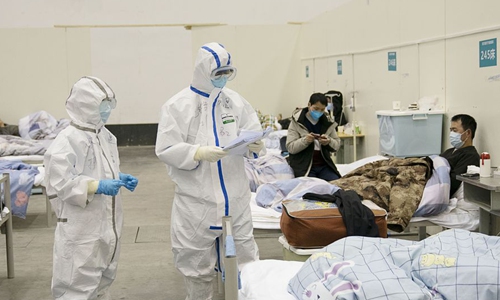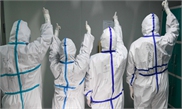NK likely to ignore US proposal to help in coronavirus fight: experts

Medical staff check a patient's condition at a temporary hospital converted from "Wuhan Livingroom" in Wuhan, central China's Hubei Province, Feb. 10, 2020. (Xinhua/Xiong Qi)
Pyongyang is likely to ignore the US' proposal to help deal with the challenge of novel coronavirus pneumonia (COVID-19) outbreak, a gesture that Chinese analysts said Washington uses to break the deadlock of negotiations but may prove unnecessary as North Korea is capable of handling the challenge on its own.
North Korean leader Kim Jong-un also made his first public appearance since the outbreak to celebrate a national holiday, the birth anniversary of the late leader Kim Jong-il, on Sunday and experts said this is also a signal that the country wants to send to the outside world that it is not vulnerable to the COVID-19 virus.
This is his first public appearance since Lunar New Year celebrations on January 25 to visit "the Kumsusan Palace of the Sun on the Day of the Shining Star, the greatest auspicious holiday of the nation," the Korea Central News Agency reported on Sunday.
Wang Junsheng, a research fellow of East Asian studies at the Chinese Academy of Social Sciences, said the US' offer actually didn't address the core issue of the current deadlock between the two countries - removing sanctions on North Korea, but Washington's proposal may gain a favorable impression among North Korean people, but it won't turn into an opportunity to break their diplomatic deadlock.
The US Department of State said in a press statement released on its website Thursday that the US is "deeply concerned about the vulnerability of the North Korean people to a coronavirus outbreak."
"We strongly support and encourage the work of US and international aid and health organizations to counter and contain the spread of coronavirus in the DPRK. The United States is ready and prepared to expeditiously facilitate the approval of assistance from these organizations," read the statement.
However, North Korea didn't give any direct response as of the press time.
Lü Chao, a research fellow and an expert on the Korean Peninsula issue at the Liaoning Academy of Social Sciences, told the Global Times this is actually a new attempt by the US government to use the COVID-19 for breaking the deadlock of negotiation, although it will almost cost nothing in reality.
Pyongyang is most likely to ignore the US' gesture because the country has effective and strict measures to cope with the challenge as its unique political system gives it advantage to regulate the flow of its people and restrict connection with the outside world, said Lü.
According to CNN on Wednesday, the World Health Organization representative in North Korea said no confirmed cases of the COVID-19 has been found in North Korea, and the country is putting efforts to safeguard the health of its people.
"Some voices in the US and South Korea said North Korea has confirmed cases among its citizens and even in its military, and the country is vulnerable when it encounters the virus. But those are predictions and rumors without any substantial evidence," Lü noted, adding that the information provided by the WHO representative is much more reliable and trustworthy. It is not responsible to claim North Korea is vulnerable to the threat of the COVID-19 with concrete evidence, he added. North Korea is not vulnerable at all, and even if there are confirmed cases, no serious outbreak will likely occur there, the expert said.
According to the Rodong Sinmun, North Korean state-run newspaper, since January 30, the country has activated the national emergency for preventing the virus, and the government has been strictly checking all personnel with recent overseas travel records and quarantining suspected cases.
The Global Times reporters found that since January 30, local media is also broadcasting news about the COVID-19 worldwide and spreading awareness every day among its people about the prevention of infection.
The Korean Central News Agency reported on Wednesday that the country is aware of the confirmed case among its neighboring countries and the unusual long incubation period of 24 days.
As a result, Pyongyang ordered that the quarantine period in the country will be temporarily extended to 30 days, and all governmental departments, institutes and all foreigners in the country must obey the new regulation.


